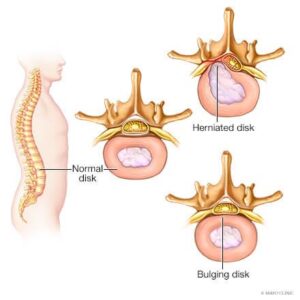RADICULOPATHY
Radiculopathy
 Radiculopathy refers to symptoms that develop when there is compression of a spinal nerve root, usually related to a disc herniation or spondylosis (degenerative changes in the spine) and may occur with or without trauma. It is important to note that not all disc herniations cause nerve compression or pain. While any nerve root can be affected, the lower cervical (neck) and lower lumbar (low back) levels are the most common. Because the fibers of one spinal nerve root provide sensation and strength in a specific region of the body, arm, or leg, a compressed nerve will cause symptoms in the region where the nerve provides strength and sensation. Nerves in your neck provide sensation and strength in your arms, while nerves in your low back provide sensation and strength in your legs. Radiculopathy is characterized by:
Radiculopathy refers to symptoms that develop when there is compression of a spinal nerve root, usually related to a disc herniation or spondylosis (degenerative changes in the spine) and may occur with or without trauma. It is important to note that not all disc herniations cause nerve compression or pain. While any nerve root can be affected, the lower cervical (neck) and lower lumbar (low back) levels are the most common. Because the fibers of one spinal nerve root provide sensation and strength in a specific region of the body, arm, or leg, a compressed nerve will cause symptoms in the region where the nerve provides strength and sensation. Nerves in your neck provide sensation and strength in your arms, while nerves in your low back provide sensation and strength in your legs. Radiculopathy is characterized by:
- Pain. For cervical radiculopathies, the pain often radiates from the neck and down the arm (sometimes to the shoulder/scapula). For lumbar and lumbosacral radiculopathies, the pain radiates from the low back down the buttock and leg.
- Numbness or tingling. These sensory changes may be present in the arm/hand or leg/foot.
- Weakness. For a cervical radiculopathy, you may have weakness in your arm/hand and notice that you drop things or have difficulty lifting things. For a lumbar radiculopathy, you may have weakness in your leg/foot and notice that you have trouble walking and catch your toe on things.
- Bladder or bowel changes. Less commonly, the nerves affecting the bladder and bowel can become compressed and contribute to loss of control and incontinence of bladder or bowel function.
Does Radiculopathy Affect Both Sides of the Body?
The symptoms associated with radiculopathy are typically unilateral (affecting one side of the body). The pain can worsen with certain movements of the neck or low back, with prolonged sitting or walking, and sometimes with coughing or sneezing.
Suffering From Pain?
